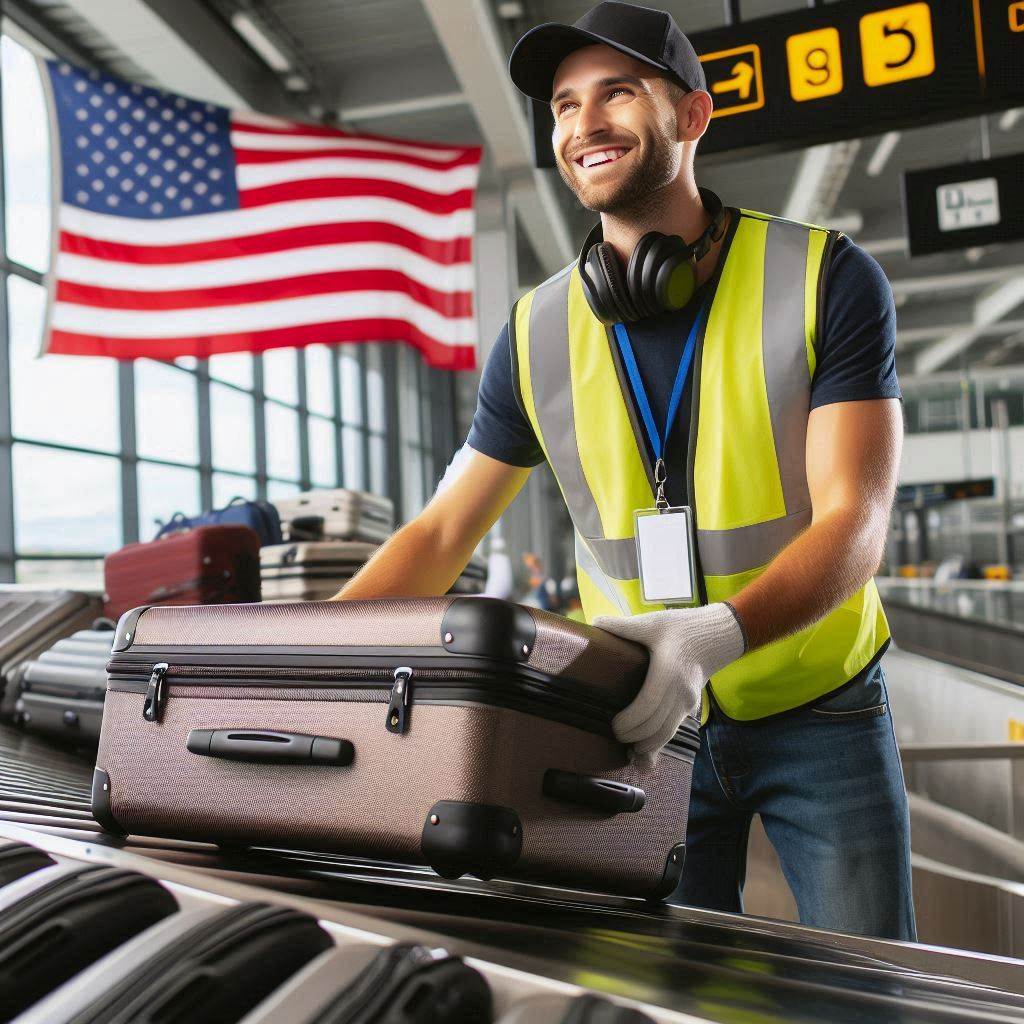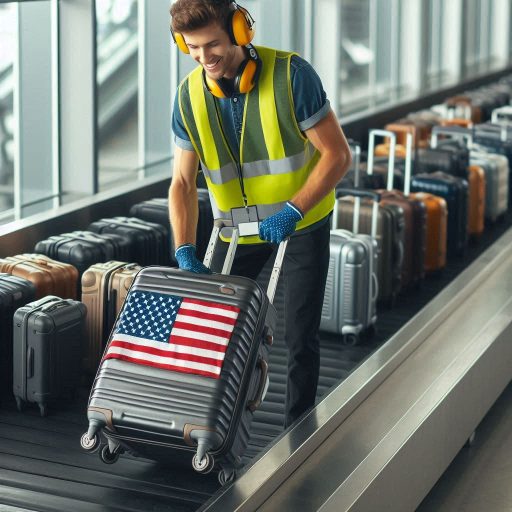Introduction
Baggage handlers play a vital role in the airline industry.
They manage the loading and unloading of luggage from aircraft.
These professionals ensure that passengers‘ belongings are transported safely and efficiently.
Their work requires physical strength, attention to detail, and teamwork.
Many baggage handlers may seek alternative careers for various reasons.
Some may desire new challenges or opportunities for advancement.
Others may experience physical strain or health issues related to the demands of the job.
Additionally, changes in personal circumstances or relocation may prompt a career shift.
Fortunately, former baggage handlers possess valuable skills transferable to other fields.
Their experience in teamwork, time management, and problem-solving can lead to diverse career options.
For instance, many may pursue roles in logistics or warehouse management.
These positions often utilize similar skills and offer opportunities for growth.
Others may consider careers in customer service, where their communication skills shine.
Additionally, some former baggage handlers may explore opportunities in aviation management or training roles.
By identifying their strengths and interests, baggage handlers can successfully transition to new careers.
Ultimately, pursuing alternative career paths can lead to fulfilling opportunities beyond the airport environment.
Transferable Skills
Skills Acquired as a Baggage Handler
Baggage handlers develop several valuable skills during their employment.
Physical stamina is one of the most significant attributes they gain.
Handlers frequently lift heavy luggage and remain active for long periods.
This stamina can benefit them in various physically demanding roles.
Attention to detail is another critical skill acquired as a baggage handler.
Ensuring that each bag is correctly loaded and unloaded requires precision.
Handlers must pay close attention to tags and labels to prevent errors.
This attention to detail translates well into other professions, particularly those requiring accuracy.
Teamwork is essential in the baggage handling role.
Handlers often work in teams to manage large volumes of luggage efficiently.
This collaborative spirit fosters strong communication skills.
Being able to work well with others is a valuable asset in many careers.
Overall, the skills gained as a baggage handler provide a solid foundation for future opportunities.
Applying Skills to Other Professions
The skills acquired as a baggage handler can be applied to various professions.
Physical stamina can benefit roles in construction, warehouse management, or landscaping.
These jobs often require similar physical exertion and endurance.
Employers in these fields value candidates who can handle strenuous activities.
Attention to detail is crucial in professions like quality assurance and data entry.
In quality assurance, employees must ensure products meet specific standards.
In data entry, accuracy prevents costly mistakes and improves overall efficiency.
Baggage handlers’ ability to focus on details makes them ideal candidates for these positions.
Teamwork skills are essential in healthcare and customer service roles.
In healthcare, professionals must collaborate with doctors, nurses, and other staff members.
Effective teamwork enhances patient care and outcomes.
In customer service, the ability to work well with colleagues ensures a positive experience for customers.
Additionally, the skills gained in baggage handling can translate into logistics and supply chain management.
These fields require individuals who understand the importance of timely deliveries and precise operations.
Handlers are already familiar with processes that ensure efficient transportation of goods.
Furthermore, baggage handlers can pursue careers in airport operations or airline management.
Their experience in the airline industry provides valuable insights into operational workflows.
They can leverage their knowledge to improve efficiency in these roles.
Finally, former baggage handlers may consider positions in security or safety management.
Their experience with adherence to safety regulations makes them suitable for these roles.
Ensuring safety in various environments is crucial in both industries.
In summary, the skills acquired as a baggage handler are transferable to many professions.
Physical stamina, attention to detail, and teamwork are valuable assets.
By identifying and applying these skills, former baggage handlers can explore diverse career alternatives and find fulfilling opportunities in various fields.
Customer Service Roles
Career Opportunities in Customer Service Industries
Former baggage handlers have numerous career alternatives in customer service industries.
Fields such as retail, hospitality, and call centers offer exciting opportunities.
These roles often value the skills developed during baggage handling.
In retail, former baggage handlers can excel as sales associates or managers.
Their experience in fast-paced environments prepares them for busy store settings.
They understand how to assist customers effectively and efficiently.
The hospitality industry also presents many options.
Former baggage handlers can transition into roles in hotels or restaurants.
Positions like front desk clerks or customer service representatives fit their skill sets well.
Call centers provide another viable career path.
Baggage handlers can leverage their communication skills to assist customers over the phone.
They can handle inquiries, resolve issues, and provide support in this setting.
Additionally, former baggage handlers possess strong problem-solving abilities.
These skills are invaluable in customer service roles.
They can assess situations quickly and offer practical solutions.
How Baggage Handling Experience Can Enhance Customer Service Skills
Baggage handling experience significantly enhances customer service skills.
Handlers develop excellent communication skills while interacting with diverse passengers.
This ability to connect with people translates well into any customer-facing role.
Additionally, baggage handlers learn to work under pressure.
They manage tight schedules and high workloads while maintaining professionalism.
This experience helps them remain calm and composed in stressful situations.
Attention to detail is another critical skill baggage handlers develop.
They ensure that luggage is handled correctly and delivered to the right locations.
This meticulousness translates to providing excellent service in retail or hospitality.
Baggage handlers also understand the importance of teamwork.
They collaborate with colleagues to ensure smooth operations.
This teamwork experience is beneficial in customer service environments, where cooperation is essential.
Moreover, baggage handlers gain valuable time management skills.
They often prioritize tasks to meet deadlines efficiently.
This ability to manage time effectively is crucial in customer service roles.
Former baggage handlers are accustomed to dealing with customer complaints.
They often handle upset passengers and resolve issues on the spot.
This experience prepares them for similar challenges in customer service positions.
Furthermore, baggage handling fosters adaptability.
Handlers learn to adjust to changing situations quickly.
This flexibility is highly sought after in customer service roles, where each day can bring new challenges.
Former baggage handlers have many career alternatives in customer service industries.
Opportunities in retail, hospitality, and call centers are readily available.
Their experience enhances essential skills like communication, teamwork, and problem-solving.
The transition to customer service roles allows former baggage handlers to leverage their existing skill sets.
By applying their baggage handling experience, they can excel in new positions.
These skills not only improve their job performance but also contribute to customer satisfaction.
Overall, the career shift can lead to fulfilling and successful futures in various customer service sectors.
Read: Understanding Pet Grooming Safety Standards
Logistics and Supply Chain Management
Potential Careers in Logistics and Supply Chain Management Where Knowledge of Baggage Handling Operations Can Be Beneficial
Former baggage handlers possess valuable skills that can translate well into logistics and supply chain management.
Their experience in baggage handling operations equips them with practical knowledge applicable to various careers in this field.
Transitioning to logistics offers a promising career path with numerous growth opportunities.
In logistics, professionals coordinate the movement of goods from one location to another.
Understanding the intricacies of baggage handling provides a solid foundation for these responsibilities.
For example, a logistics coordinator oversees the entire supply chain process, managing inventory, tracking shipments, and ensuring timely delivery.
Former baggage handlers excel in this role due to their experience with tracking and organizing luggage efficiently.
Another potential career is in warehouse management, where individuals supervise daily operations in distribution centers.
These managers focus on inventory management, staff training, and ensuring safety compliance.
Former baggage handlers understand the importance of efficiency and organization in a warehouse setting, making them well-suited for this role.
Transportation management is another area where former baggage handlers can thrive.
Transportation managers plan and coordinate logistics related to freight movement, overseeing carrier relationships and ensuring that shipments arrive on time.
Baggage handlers‘ experience with loading and unloading operations gives them valuable insights into transportation efficiency.
Former baggage handlers can also pursue a career as supply chain analysts.
These professionals evaluate processes to identify areas for improvement.
They analyze data, forecast demand, and implement strategies to optimize operations.
Familiarity with logistics helps former baggage handlers effectively assess workflows and suggest enhancements.
Examples of Job Titles and Responsibilities in This Field
Freight forwarding is another promising career path for former baggage handlers.
Freight forwarders arrange the transportation of goods on behalf of clients, managing documentation, negotiating rates, and ensuring compliance with regulations.
Knowledge of baggage handling operations enhances their understanding of logistics processes, enabling them to navigate challenges effectively.
Inventory control specialists are responsible for monitoring stock levels and maintaining accurate records.
They work to minimize discrepancies and ensure inventory accuracy.
Former baggage handlers‘ attention to detail and organizational skills are crucial in this role, helping them excel in maintaining efficient operations.
Finally, operations managers oversee daily business activities in logistics and supply chain organizations.
They ensure processes run smoothly, manage budgets, and optimize resource allocation.
Former baggage handlers‘ experience in a fast-paced environment prepares them for this leadership role, allowing them to implement strategies that enhance efficiency and productivity.
In general, former baggage handlers can find rewarding careers in logistics and supply chain management.
Their knowledge of baggage handling operations provides a valuable foundation for various roles in this field.
By leveraging their skills in organization, problem-solving, and communication, they can excel in diverse positions within logistics.
The logistics industry offers numerous opportunities for growth and advancement, opening doors to new challenges and experiences while utilizing their existing skills.
Read: Understanding Nail Disorders: A Technician‘s Guide
Transportation and Distribution
Transitioning into Roles Within the Transportation and Distribution Sector
Former baggage handlers possess valuable skills that translate well into the transportation and distribution sector.
They understand the importance of efficiency and teamwork in a fast-paced environment.
Many of their experiences, such as handling luggage and operating equipment, prepare them for various roles.
To transition effectively, former baggage handlers should assess their skills and interests.
They can identify positions that align with their experience and career goals.
Networking with former colleagues in the industry can also provide insights into potential job openings.
Additionally, seeking further training or certification can enhance their qualifications.
Many community colleges and vocational schools offer programs in logistics and transportation management.
Completing these courses can help former baggage handlers stand out in a competitive job market.
Suitable Positions in Trucking, Shipping, or Warehousing
One promising career path for former baggage handlers is in trucking.
They can pursue roles such as truck driver or logistics coordinator.
As a truck driver, they will transport goods to various destinations.
Their familiarity with time management and route planning will benefit them in this role.
Logistics coordinators manage the supply chain, ensuring timely delivery of products.
Their experience in coordinating baggage flow can directly translate to this position.
Strong communication and organizational skills will help them excel as logistics coordinators.
Another option in trucking is working as a freight handler.
This role involves loading and unloading goods, similar to handling luggage.
Former baggage handlers can apply their knowledge of safe handling and equipment operation in this position.
Shipping is another sector where former baggage handlers can find rewarding careers.
Positions such as shipping clerk or warehouse associate may suit their skill set.
Shipping clerks prepare packages for distribution and maintain accurate records.
Their attention to detail, honed during their time as baggage handlers, is crucial in this role.
Warehouse associates perform essential tasks, including picking, packing, and shipping orders.
Former baggage handlers‘ experience with inventory management and teamwork will serve them well.
They can quickly adapt to the fast-paced nature of warehouse operations.
Warehousing also offers numerous opportunities for former baggage handlers.
They can pursue roles such as warehouse supervisor or inventory control specialist.
Warehouse supervisors oversee daily operations and manage staff.
Their experience working in a busy airport environment prepares them for this responsibility.
Inventory control specialists track stock levels and manage inventory systems.
Former baggage handlers already understand the importance of accuracy in inventory management.
Their background will enable them to thrive in this role.
Basically, former baggage handlers have many career alternatives in the transportation and distribution sector.
By leveraging their skills and seeking further training, they can transition into roles in trucking, shipping, or warehousing.
With determination and a proactive approach, they can successfully build new careers in these dynamic industries.
Read: How to Deal with Pet Grooming Allergies

Aviation Industry
Career Options Within the Aviation Industry
Former baggage handlers have various career options within the aviation industry.
Their experience provides a solid foundation for several roles.
One option is working in airline operations.
This role involves overseeing daily flight schedules and coordinating various activities.
Baggage handlers understand the importance of timely operations, making them suitable candidates.
Another viable career path is ground crew management.
Ground crew managers supervise baggage handlers and other support staff.
They ensure that all tasks are completed efficiently and safely.
Baggage handling experience equips individuals with the necessary skills for effective management.
Their firsthand knowledge of the ground operations enhances their leadership abilities.
Aircraft maintenance is another promising field for former baggage handlers.
While this role requires additional training, the experience gained from baggage handling is beneficial.
Understanding the operational aspects of airlines helps maintain high safety standards.
Former handlers can transition into maintenance roles by pursuing relevant certifications.
Roles in Customer Service and Passenger Assistance
Customer service positions within airlines also suit former baggage handlers.
Their experience interacting with passengers allows them to provide excellent support.
These roles often involve assisting passengers with inquiries and addressing concerns.
Baggage handlers already understand the importance of a positive customer experience.
Additionally, former baggage handlers can work as passenger service agents.
This role involves checking in passengers and managing boarding processes.
Their familiarity with luggage handling and airline protocols makes them effective in this position.
They can smoothly transition to providing direct assistance to travelers.
Safety and security roles within the aviation industry also offer opportunities.
Former baggage handlers can become safety officers, ensuring compliance with safety regulations.
Their experience with handling luggage and equipment gives them insight into potential hazards.
This knowledge enables them to create safer work environments.
Security positions at airports are another option.
Baggage handlers understand the importance of security protocols in the aviation industry.
They can effectively contribute to maintaining safety standards and procedures.
These roles often require training, but prior experience provides a strong foundation.
Exploring Administrative Roles
Administrative positions within airlines can also be appealing.
Former baggage handlers can pursue roles in scheduling or logistics.
Their understanding of flight operations helps them manage schedules effectively.
These positions often involve coordinating staff and resources, which aligns with their experience.
Furthermore, positions in airline marketing or communications may interest former baggage handlers.
Their background gives them insight into airline operations, enhancing their contributions.
Understanding the airline industry helps in developing effective marketing strategies.
Former baggage handlers have numerous career alternatives within the aviation industry.
Options include airline operations, ground crew management, and aircraft maintenance.
Additionally, customer service roles, safety positions, and administrative jobs provide valuable opportunities.
Their experience and skills allow them to transition smoothly into these roles, ensuring continued success in their careers.
Read: Creating a Comfortable Atmosphere in Your Nail Salon
Security and Safety
Opportunities in Security and Safety Professions
Former baggage handlers possess valuable skills relevant to security and safety professions.
Their awareness of safety protocols makes them ideal candidates for various roles.
These skills can seamlessly transfer to positions requiring vigilance and risk management.
In security roles, former baggage handlers can leverage their experience.
They understand how to assess environments for potential threats.
This awareness is critical in maintaining safety at airports, events, and public venues.
Their background equips them to identify unusual behavior or unsafe conditions.
Moreover, baggage handlers often excel in high-pressure situations.
This experience allows them to remain calm and focused during emergencies.
Security roles frequently require quick decision-making, which former baggage handlers can provide.
Their hands-on experience enhances their ability to handle diverse situations effectively.
Roles in Security Agencies
Security agencies offer numerous career opportunities for former baggage handlers.
Positions include security officers, loss prevention specialists, and security analysts.
These roles require a keen understanding of safety protocols and risk assessment.
Security officers protect people and property in various settings.
They monitor surveillance systems and conduct routine inspections.
Former baggage handlers can excel in this role due to their background in logistics and safety.
Loss prevention specialists focus on reducing theft and ensuring safety in retail environments.
They apply their experience in identifying vulnerabilities and implementing preventive measures.
This role leverages their skills in observation and risk management.
Security analysts assess security systems and develop strategies to enhance safety.
They analyze data to identify trends and potential risks.
Baggage handlers’ experience with safety protocols makes them strong candidates for this analytical position.
Emergency Response Teams
Former baggage handlers can also find fulfilling roles in emergency response teams.
These teams require individuals who can act decisively in emergencies.
Baggage handlers‘ experience in high-stress situations prepares them for this demanding work.
Emergency responders must communicate effectively with team members.
Baggage handlers have honed their communication skills while working closely with colleagues.
This teamwork experience is invaluable during emergencies when coordination is crucial.
Roles within emergency response teams include EMTs, firefighters, and disaster response coordinators.
Each position requires a strong foundation in safety protocols.
Former baggage handlers can thrive in these roles, bringing their skills and knowledge to the table.
Safety Consulting Firms
Safety consulting firms also present excellent career alternatives for former baggage handlers.
These firms help businesses develop and implement safety protocols.
Former baggage handlers can leverage their practical knowledge to assess risks and recommend improvements.
As safety consultants, they can conduct audits and training sessions for clients.
Their firsthand experience in maintaining safety standards allows them to provide valuable insights.
This role combines their background with a focus on enhancing workplace safety.
Moreover, safety consulting firms often work across various industries.
This diversity offers former baggage handlers the chance to explore new fields.
Whether in construction, manufacturing, or healthcare, their skills remain applicable.
Overall, former baggage handlers have numerous career alternatives in security and safety professions.
Their awareness of safety protocols positions them well for roles in security agencies, emergency response teams, and safety consulting firms.
By leveraging their existing skills, they can successfully transition to fulfilling and impactful careers.
These opportunities not only utilize their background but also contribute to safer environments for all.
Transform Your Career Today
Unlock a personalized career strategy that drives real results. Get tailored advice and a roadmap designed just for you.
Start NowTraining and Management
Career Paths in Training or Management for Former Baggage Handlers
Former baggage handlers possess valuable skills that can translate into various career paths.
Their experience overseeing operations gives them a unique perspective.
Many positions in training and management can benefit from their background.
These roles allow individuals to leverage their hands-on knowledge while advancing their careers.
One potential career path is in staff training.
Former baggage handlers can use their experience to train new employees.
They understand the day-to-day challenges and can provide practical insights.
This role involves creating training materials and conducting sessions.
A strong foundation in safety procedures and operational protocols is crucial.
Operations management is another suitable option.
Former baggage handlers can oversee airport operations, ensuring efficiency and safety.
They can manage teams, monitor performance, and implement improvements.
Their experience working in fast-paced environments prepares them for these responsibilities.
Understanding the logistics of baggage handling can enhance operational strategies.
Additionally, project management offers a compelling career alternative.
Former baggage handlers can lead projects aimed at improving processes.
Their firsthand knowledge of workflows makes them valuable assets in these roles.
They can develop project plans, allocate resources, and track progress.
Effective communication and collaboration are essential skills for success in project management.
Positions in Staff Training, Operations Management, or Project Management
Several specific positions align well with the skills of former baggage handlers.
In staff training, roles such as Training Coordinator or Training Specialist are ideal.
These positions involve developing training programs and evaluating employee performance.
Baggage handlers‘ experience enables them to identify crucial skills that need emphasis.
In operations management, positions like Operations Supervisor or Operations Manager are suitable options.
These roles involve overseeing daily operations, managing staff, and ensuring compliance with safety regulations.
Baggage handlers can apply their understanding of logistics to optimize processes.
They can also address challenges and implement effective solutions.
For those interested in project management, roles such as Project Coordinator or Project Manager are promising.
These positions require planning, executing, and closing projects on time and within budget.
Baggage handlers‘ experience in fast-paced environments equips them with skills to manage multiple tasks simultaneously.
Furthermore, pursuing additional training or certifications can enhance career prospects.
Many organizations offer programs in management and project management.
Completing these programs can bolster resumes and increase employability.
To sum it up, former baggage handlers have numerous career alternatives that leverage their operational experience.
Positions in staff training, operations management, and project management provide excellent opportunities for growth.
By pursuing these paths, they can transition into rewarding roles while utilizing their unique skill sets.
Embracing new challenges can lead to fulfilling careers beyond baggage handling.
Find Out More: Impact of Technology on Service Industry Data Entry
Conclusion
Former baggage handlers have diverse career alternatives to explore.
Their experience in fast-paced environments equips them with valuable skills.
Many can transition to roles in logistics and supply chain management.
These positions involve coordinating shipments and managing inventory effectively.
Some former baggage handlers might find success in customer service roles.
Their experience in interacting with passengers translates well into this field.
Additionally, they can consider positions in airport operations or management.
These roles involve overseeing daily operations and ensuring efficiency.
Others may pursue careers in transportation or freight handling.
Their knowledge of safety protocols and handling procedures is advantageous in these areas.
Additionally, some former baggage handlers may explore opportunities in warehouse management.
These roles focus on inventory control and staff supervision.
Individuals should consider their skills and interests when exploring new career paths.
Reflecting on what aspects of baggage handling they enjoyed can provide valuable insights.
Seeking additional training or certifications can further enhance their qualifications.
Former baggage handlers have many career options available.
By leveraging their skills and experiences, they can successfully transition into new fields.
Embracing these alternatives can lead to fulfilling and rewarding careers.
[E-Books for Sale]
The Big Book of 500 High-Paying Jobs in America: Unlock Your Earning Potential
$19.99 • 500 High-Paying Jobs • 330 pages
Explore 500 high-paying jobs in America and learn how to boost your career, earn more, and achieve success!
See All 500 High-Paying Jobs of this E-Book
1001 Professions Without a Degree: High-Paying American Jobs You Can Start Now
$19.99 • 1001 Professions Without a Degree • 174 pages
Discover 1001 high-paying jobs without a degree! Unlock career tips, skills, and success strategies for just $19.99!




